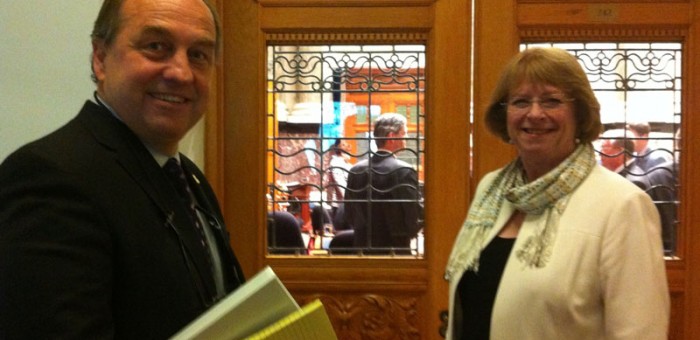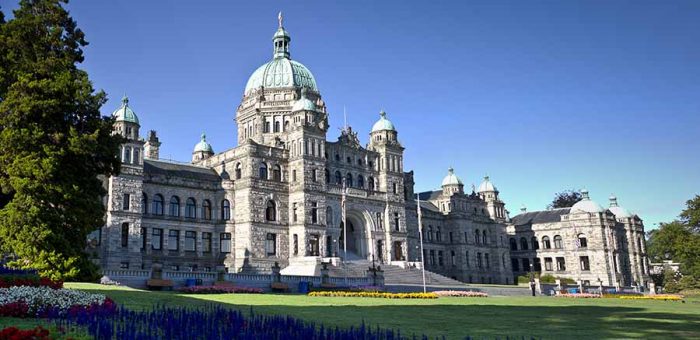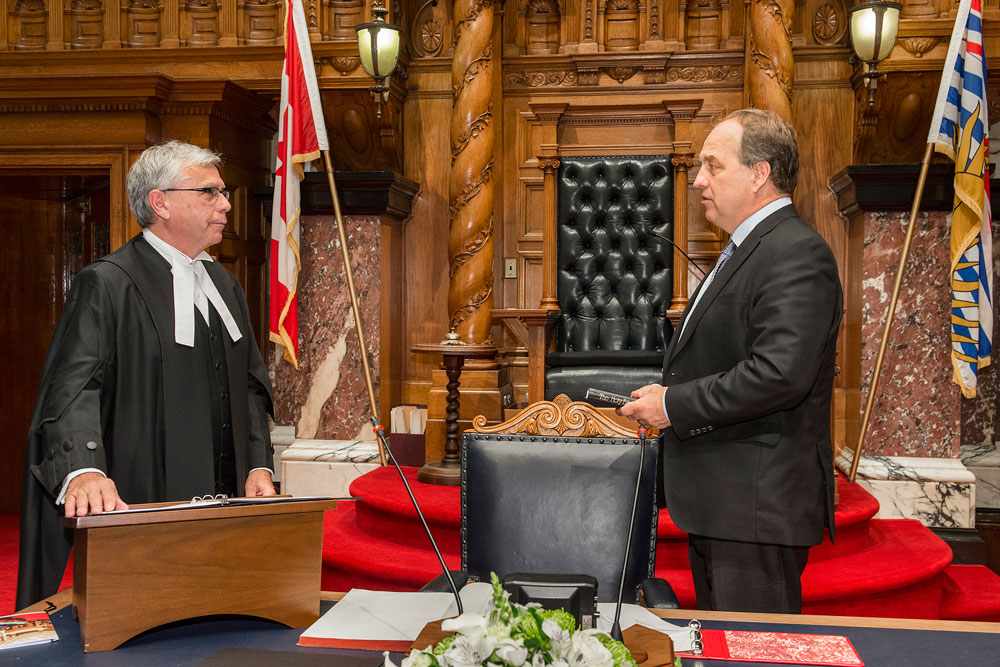Democratic Reform
Introducing Term Limits for BC MLAs
Today in the legislature I introduced a bill that would limit the number of terms a person could be elected as an MLA: Bill M236 —Election Amendment Act 2. The purpose of this bill is to ensure that those seeking elected office recognize that serving the people of British Columbia should be interpreted as a sense of civic duty, not a career path.
Below I provide the full text and video of my introduction of the Bill.
Text of Introduction
A. Weaver: I move that a bill intituled the Election Amendment Act 2, 2017, of which notice has been given in my name, be introduced and read a first time now.
Motion approved.
A. Weaver: I am pleased to introduce the bill entitled Election Amendment Act 2. This bill is designed to set term limits on elected officials of the B.C. Legislature. If enacted, this bill would limit MLAs to 12 years, or three terms. In addition, an individual could not be nominated for re-election if they had already served eight years as Premier.
The introduction of term limits would ensure that those seeking elected office recognize that serving the people of British Columbia should be interpreted as a sense of civic duty, not a career path.
The general public have become cynical about politics and career politicians. Voter turnout is on the decline. By introducing term limits, certain elected officials will be freed up to think about the long term consequences of their decisions rather than just their re-election goals. It will ensure a continued rejuvenation of this Legislature.
I feel that we are still fighting the Cold War in this chamber. We’ve got politicians who’ve been here, on both sides of the House, since the 1990s. When the same players continue their never-ending dance of dysfunction, British Columbians all lose. The type of behaviour that we witnessed this morning in question period is a testament to that.
Madame Speaker: Member, just to the content of the bill.
A. Weaver: I move that the bill be placed on the orders of the day for second reading at the next sitting of the House after today.
Bill M236, Election Amendment Act 2, introduced, read a first time and ordered to be placed on orders of the day for second reading at the next sitting of the House after today.
Video of Introduction
Reintroducing a Bill to Lower the Voting Age to 16 in British Columbia
Today in the legislature I reintroduced a bill that if enacted would lower the voter age in British Columbia from 18 to 16. The new name of the bill is Bill M220 — Election Amendment 1, 2017.
Those who have been following this site will know that last year, I initiated a conversation on whether or not we should reduce the voting age to 16. The response on social media was wonderful and we received many emails on the topic.
It turns out that this conversation is not only happening now in BC. Prince Edward Island held a referendum in the fall on electoral reform. The eligibility to vote will be extended to youth aged 16 and 17 in this referendum.
Below please find reproductions of both the text and video of the introduction of my bill. In addition, I reproduce the accompanying press release.
Text of Introduction
A. Weaver: I move that a bill intituled the Election Amendment Act, 2017, of which notice has been given, be introduced and read a first time now.
Motion approved.
A. Weaver: In this bill I’m introducing today, I would propose lowering the voting age to 16 in the province of British Columbia. There’s a lot of evidence to suggest that the earlier in life a voter casts their first ballot, the more likely they are to develop voting as a habit throughout their life.
It’s also a common misconception that 16-year-olds are not as informed on and engaged in political issues as older voters. The research, however, says otherwise. These young citizens of British Columbia are old enough to drive, pay taxes and sign up for the military. In fact, the notion of taxation without representation is one that is not founded within our democracy. We require representation with taxation. Austria, Argentina, Brazil, Germany and parts of the U.K. have extended voting rights to 16-year-olds, and it’s time British Columbia do the same.
I move that the bill be placed on the orders of the day for second reading at the next sitting of the House after today.
Madame Speaker: Hon. Member, was that No. 1 or No. 2?
A. Weaver: That was No. 1. I’m sorry. Thank you, hon. Speaker.
Madame Speaker: No worries.
Bill M220, Election Amendment Act 1, 2017, introduced, read a first time and ordered to be placed on orders of the day for second reading at the next sitting of the House after today.
Video of Introduction
Media Release
Andrew Weaver introduces bill to lower the voting age in B.C.
For immediate release
February 20, 2017
VICTORIA B.C. – Today Andrew Weaver, MLA for Oak Bay-Gordon Head, re-introduced the Election Amendment Act 1, which seeks to engage youth in politics through lowering the voting age to 16.
“There is a lot of evidence that shows that if we engage our youth earlier in the political process they are more likely to develop voting as a habit for the rest of their life,” says Weaver, also the Leader of the B.C. Green Party.
“I’ve been speaking to individuals of all ages since I introduced this bill last Spring. I have heard overwhelming support for lowering the voting age.
“The decisions we make today as legislators will have a profound impact on the lives of our youth. I can’t think of a good reason why they shouldn’t have a stake in those decisions.
“It appears there is a trickle-up effect in civic participation. When youth engage, conversations around the dinner table tend to focus on politics and local issues, which results in a positive impact on voter turnout for the whole family.”
Many other jurisdictions, including Austria, Argentina, Brazil, Germany, and parts of the UK, have extended voting rights to 16-year-olds. Scotland experimented by lowering the voting age in their independence referendum. It was so successful that they subsequently permanently dropped the voting age to 16 in all Scottish Parliament and local government elections.
-30-
Media Contact
Mat Wright – Press Secretary Andrew Weaver MLA
1 250 216 3382
mat.wright@leg.bc.ca
Responding to Prime Minister’s reversal on proportional representation
Andrew Weaver responds to Prime Minister’s reversal on proportional representation
For immediate release
February 1st, 2017
VICTORIA B.C. – The B.C. Green Party holds proportional representation as a foundational aspect of their platform and is committed to implementing the system in British Columbia.
“We support proportional representation because it is a fairer voting system, which encourages democratic participation and accurately reflects voters’ choices in the make-up of government,” said Andrew Weaver, MLA for Oak Bay – Gordon Head.”
“I am profoundly disappointed with Prime Minister Trudeau’s betrayal of his election promise. This is a matter of trust. People put their trust in elected officials and the Prime Minister has greatly damaged that confidence.”
“As an MLA and Leader of the B.C. Green Party, I am working to prove that politicians can and should be held accountable to their commitments. I hope to demonstrate that elected officials can serve the public with evidence-based policies and honesty and still be successful. And, as a party, we are evidence that parties can ban corporate and union donations and still be effective.
“The B.C. Green Party is seeking a mandate to govern from British Columbians, and the only way to do this is to earn their trust, through showing that we stay true to our principles and will deliver on our commitments.”
“The B.C. Green Party is committed to implementing proportional representation in British Columbia, and as we near the 2017 election, look for the imminent release of our plan.
“British Columbians expect better than what they are currently getting from their elected officials, and we promise to deliver better.”
– 30 –
Media contact
Mat Wright, Press Secretary
+1 250-216-3382 | mat.wright@leg.bc.ca
Politics for the people, by the people
Looking ahead to 2017, I can’t help but feel incredibly excited – not the least of which is because the provincial election is on the horizon. I sincerely thank you for putting your trust in me these past four years. This May I’m hopeful that you will afford me the distinct honour of serving you as your MLA for a second term. I’m also eager to see how the election will play out across British Columbia.
The politics of 2016 were trying, to say the least, but I feel that positive change is afoot in B.C. From east to west and north to south people are realizing that status-quo politics is not serving them or their communities. We are seeing people reach their limits with parties who bend to organized union or corporate interests. People are fed up with political parties and their MLAs being reduced to puppets controlled by corporate or union puppet masters with a firm grip on their purse strings. The election, however, will put the power back where it belongs, in the hands of British Columbians.
Since the B.C. Greens, of which I am now the leader, stopped accepting corporate and union donations, we have seen an incredible ground swell of support. Politics for the people, by the people, has really struck a chord in B.C. and I know it has not gone unnoticed by other politicians. These politicians now have to leave their back room meetings and answer directly to British Columbians. And British Columbians are demanding thoughtful responses, not sound bites or media lines, to their questions about housing, affordability, public education, income security, MSP premiums and hydro rates, environmental protection, climate change, doctor shortages, and the spiraling Fentanyl overdose epidemic, to name but a few.
The riding of Oak Bay – Gordon Head had the highest voter turnout in the province in 2013, something I am endlessly proud of to this day, and I’m optimistic that the change that started in our community will spread to other ridings in 2017.
I draw my inspiration from our community that I’ve been grateful to call home for my entire life. I was born in Victoria, attended Oak Bay High School, raised my family in Gordon Head and built a career here. As a professor at the University of Victoria for the past twenty-five years, I have been fortunate enough to work with, and teach, some of the brightest minds in science.
The B.C. Greens have incredible candidates stepping up across the province. I’m convinced that this election will be the first time in a very long time that voters have a viable third choice, and no longer have to hold their nose when voting for the lesser of two evils. It’s my job as leader of the party to provide people with something they can vote for, not against.
We will face some massive challenges in our future, to be sure, but I am confident we will overcome them. As always, if you have any comments, questions, or concerns, please don’t hesitate to get in touch with my office.
I wish everyone a safe and happy New Year.
Fighting for my Right to do the Job the Official Opposition Leader did not do
Last week I argued that the Leader of the Official Opposition acted in a cowardly fashion in attempting to shut down estimates of the Office of the Premier. I pointed out that it was cowardly for two reasons. First, the fact that the Leader of the Opposition would run away from an opportunity to question the Premier on a diverse array of issues is cowardly. It’s his job to do so. It certainly appears that he is afraid of challenging the Premier face to face.
If the Leader of the Opposition is afraid, that’s one thing. I was not afraid. I would have been willing to take much more than my allocated time on Thursday if extra time was available. I had prepared six longer primary questions (which would spin off into numerous smaller follow ups). I had other secondary questions that I would have loved to raise on a diverse range of topics, from housing through social services through education and so forth. And this brings me to the second reason why I think it’s cowardly.
Just because the Leader of the Opposition no longer wants to ask questions does not give him the right to go against a long standing tradition of organized time allocation and take away my right as well. The people of British Columbia deserve better leadership and better opposition.
Today in the Legislature I rose on a point of order. As you will see from my Point of Order, it is my view that the estimates of the Office of the Premier have not yet concluded due to a procedural error. Once more, the BC NDP asked the Chair to not allow me time.
The text and video of my point of my point of order are reproduced below. At the end, I once more link the Video showing proceedings that closed Premier’s estimates.
UPDATE:
On Tuesday, May 17 the Chair provided a very thoughtful and thorough analysis in ruling against my point of order. I appreciate the work that went into it. I have reproduced the ruling at the end of this post.
Text of my Point of Order
A. Weaver: I rise on a point of order. This is the first time I have been able to rise on this point of order for two reasons. First, on Thursday of last week, I spent much of the day in communications with a variety of offices to determine what transpired with respect to the closing of debate on estimates for the Office of the Premier. I also only received the relevant Hansard clip on Friday.
As I’d mentioned to the Speaker’s office on Thursday last week, my office had coordinated through the Opposition House Leader’s office that I would be speaking to the Premier’s estimates. It was agreed that I would rise early Thursday morning.
Between 6:20 and 6:25 on Wednesday last week, at 292 minutes, 14 seconds of the online Hansard video on May 11, the Premier rose in estimates and stated the following: “With that, Mr. Chair, I rise to report progress and ask leave to sit again.” The Chair then said this: “Hon. members, you heard the motion. All in favour say aye.” The motion carried.
At this point, the committee had risen, and it was very clear that the Chair left his seat. There appeared to be some commotion in the chamber after the passing of this motion. Conversations went back and forth between the Premier and the Leader of the Official Opposition. The Chair remained standing during these conversations. Some notes got passed around. The Clerk also stood to speak with the Premier. The Chair returned to his seat but said nothing while the Clerk was standing and speaking to the Premier.
Eventually the Chair issued a single word. “Premier,” he said. At this point the Premier is audibly heard on Hansard saying: “It’s not mine.” She’s referring to a motion written on a piece of paper that had been passed to her. The Premier then says the following: “By agreement with the opposition, I move that the committee rise and report completion of the resolution and ask leave to sit again.” After this motion passes, the Premier states this: “Are you sure that was legally done?”
In my view, there is a very clear procedural error here. The Chair at no time called the committee back to order while sitting in the chair. Since the earlier motion to rise and report progress had indeed passed, the second motion regarding completion would, in my view, be out of order, as the committee had not been called to order again. It had simply risen.
As such, it is my view that the estimates of the Office of the Premier have not yet concluded. Hon. Chair, I would kindly ask that you consider these comments and consider providing a ruling to this House at a later time. Thank you for your consideration of this very important matter.
M. Farnworth: This is not a procedural point of order. In fact, it would be classed as argument. So, hon. Chair, I respectfully ask that you rule that this is, in fact, not a point of order.
The Chair: Hon. Members, I would take the member’s point of order on advisement. Thank you.
Video of my Point of Order
Video Close of Proceedings on May 11
Point of Order — Chair’s Ruling
The Chair: Before I recognize the Minister of Finance, I have a statement to make.
On Monday, May 16, at the commencement of Committee of Supply, Section B, the member for Oak Bay–Gordon Head rose on a point of order regarding the conclusion of estimates of the Office of the Premier on Wednesday, May 11. I have reviewed the Votes and Proceedings, the Hansard transcript and the video of the proceedings in question.
I acknowledge the question the member raised, but I do not agree that the Committee of Supply was not properly constituted and that, therefore, it could not consider or adopt the motion regarding Vote 10, the 2016-17 estimates for the Office of the Premier.
The proceedings unfolded as follows. An initial motion was moved by the hon. Premier that the committee “rise, report progress and ask leave to sit again.” The Chair put the motion to the committee, and the motion was carried. Normally, the presiding officer would leave the chair and report to the Speaker. However, that did not occur.
Although the presiding officer rose briefly, he was immediately advised that it was the will of the committee to complete consideration of the estimates of the Office of the Premier. At that point, the committee had not formally closed proceedings, nor did the Chair declare that the committee was adjourned. In addition, Office of the Premier staff remained in the Chamber, though it is required that all public servants must depart immediately upon the adjournment of Committee proceedings.
The presiding officer resumed formal proceedings and recognized the Premier, who moved the motion to report completion of the estimates for the Office of the Premier. This motion, and the motion to approve Vote 10, were duly adopted with consent of the committee had altered its original decision to report progress by unanimous agreement of all members duly present and assembled in the chamber at that time.
The Chair did not call the committee back to order, as a recess or adjournment had not been declared. There had simply been a pause in the proceedings in order to confer and clarify with committee members on the status of business. This is not an unusual practice, as presiding officers often will consult informally with members during proceedings to clarify the status of business under consideration or to coordinate matters relating to the management of parliamentary business.
While the video recording captured the informal discussions of members, pursuant to the longstanding Hansard transcript practice they were clearly not part of the formal proceedings. Further, it should be noted that during the entire proceedings, the mace remained in the lowered position, indicating that the House was in committee. In addition, the Speaker had not resumed the chair nor received a report from the committee.
In other words, at all times during the closing of the estimates of the Office of the Premier, the Committee of Supply remained constituted. The presiding officer followed the correct procedure to continue in committee and allow the will of the committee to be respected. It is immaterial that the informal discussion among members to complete the estimates occurred off the record and were recorded on video as interjections.
The Chair heard these discussions and continued to preside in Committee of Supply, rather than reporting to the Speaker. The Premier’s final motions were moved with the unanimous consent of the Members present, were deemed in order and duly passed.
Accordingly, the remainder of the proceedings and the closing of the Estimates of the Office of the Premier on May 11 were in order.
Thank you.
A. Weaver: I just wish to thank you for a very thoughtful and thorough analysis of my point of order, and I do appreciate the work that went into it.








